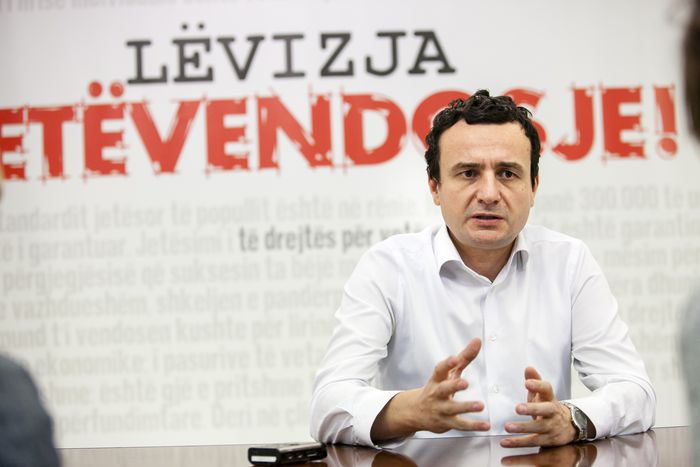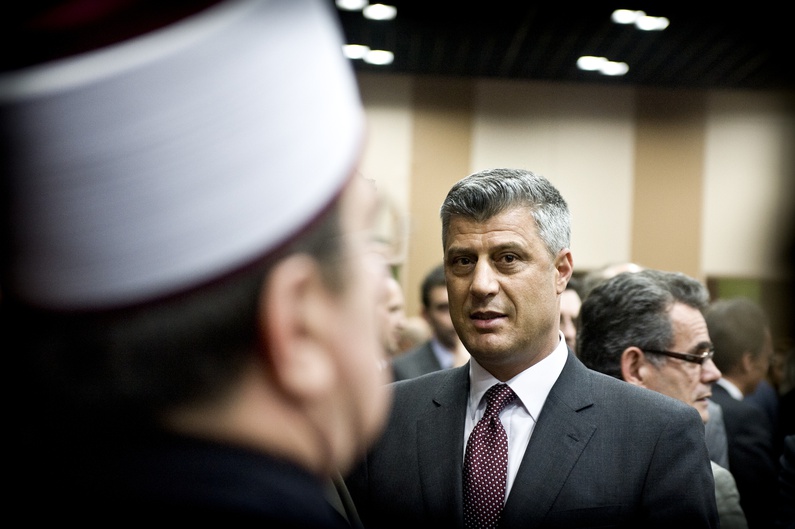
Kosovo alternative: THE LIFE OF A Blackbird ?
Published on
Translation by:
Danica JordenWhile the PDK, the party of Kosovo's exiting president, led last June's elections, Hashim Thaçi has still not managed to reach an accord to form a government. In the midst of a full institutional crisis, the Vetëvendosje hardliners are making a name for themselves in the land of the blackbirds.
« FUCK Eulex ! ». On the walls of the capital city of Pristina, the partisans of Vetëvendosje' - which means self-determination - have made their marks: splatters of graffiti insulting the international community and violent demonstrations against the "dialogue" between Pristina and Belgrade. Vetëvendosje', the political group launched in 2008 by the charismatic Albin Kurti, has been amassing more and more votes in Kosovo, priming a wave of political renewal in the country.
Albin's collar
Albin's rise began in December 2010, when Vetëvendosje' garnered third place in the elections and managed, thanks to a Facebook campaign, to unite the next generation Kosovars, frustrated by an unemployment rate flirting with 40%, the economic slump, and the corruption of the elite in power.
The party's headquarters are located in the heart of the capital, a stone's throw from the Mother Theresa pedestrian mall and the luxurious Swiss Diamond hotel. A large Albanian flag, a black eagle against a red background, flaps in the wind while a group of toughs in leather jackets smoke as they watch the entrance. On this evening in Octobre 2012, the founder of Vetëvendosje' leaves a difficult meeting at Parliament. He rages against the reigning power's "attempts to privatise" the country. "By virtue of their liberal posturing, the team in place is ready to dismantle the State, shamelessly selling off its businesses and properties to groups of foreigners. Privatisation does not mean liberation. What can one say of an economic system that turns a politician into a businessman ? What we want is economic democracy."
With his immaculate shirt, suit and baby face, Kurti is quite young. At 39, his handshake is warm, his English excellent and his posture almost presidential. Stationed behind a desk in a conference room lit by two projectors, his speech is carefully rehearsed. "Thanks to our elected deputees, we are working within the system. It's far from perfect but we believe in what we're doing. Representing democracy is not enough," he says. "Kosovo needs participative democracy." Often accused of nationalism, Kurti skirts the issue adroitly. "Kosovo is experiencing today an extreme situation where normality causes one to be accused of being radical - where if you are normal, you're called radical."
Albin Kurti first studied in Pristina's clandestine universities during the apartheid, and then obtained a diploma from the London School of Economics. Between the two, he took a remarkable sabbatical in the resistance during the battle for the liberation of Kosovo, with the UÇK (the Kosovo Liberation Army who fought for independence) guerrillas, for whom he was a long-time spokesperson. Arrested during the NATO bombardments, Kurti was ultimately imprisoned in Serbia. He is now one of the most promising politicians in the region.
"Zeus on Mount OlympUS"
The movement's warhorse, "Self-Determination", is the fight against the corruption of the present party in power, the PDK of Prime Minister Hashim Thaçi. "It is time to stop financing parallel structures that undermine Kosovo's independence," the young leader says. "Who is making the casinos and shopping centres in our economy? Kosovo fulfilled all its engagements and concessions. The country's development should not be riddled with foreign aid. It should come from within and through its own resources."
International diplomats don't care much for Albin Kurti. In his speeches, he doesn't mind denouncing the "colonialism" of international officers, the "protectorate of bureaucrats" present in Kosovo for more than a decade, led by the UN and the European Union. "Look at the American embassador in his villa in Dragodan (the embassy neighbourhood in Pristina), like Zeus on Mount Olympus! He thinks he's the king of Kosovo while we're declaring ourselves a Republic," he declares to me with a sardonic smirk.
 "It's time for the EU to stop pressuring and redefine its Balkans strategy," foresees Kurti, with a predatory smile. "The present negotiations with Serbia (the historique dialogue between Belgrade and Pristina that will be signed in April 2013) is an infringement upon our territorial integrity. Because we have neither sovereignty nor economic development: we went from the prison of Serbian apartheid to the jungle of the international community." Of course, Kurti aspires to join the European Union, but as a "sovereign State." The problem as he sees it: Brussels is too afraid of Serbia, "the little Russia in the Balkans, an important destabilising factor."
"It's time for the EU to stop pressuring and redefine its Balkans strategy," foresees Kurti, with a predatory smile. "The present negotiations with Serbia (the historique dialogue between Belgrade and Pristina that will be signed in April 2013) is an infringement upon our territorial integrity. Because we have neither sovereignty nor economic development: we went from the prison of Serbian apartheid to the jungle of the international community." Of course, Kurti aspires to join the European Union, but as a "sovereign State." The problem as he sees it: Brussels is too afraid of Serbia, "the little Russia in the Balkans, an important destabilising factor."
There is only one country that Kurti respects and cherishes, he swears with his hand on his heart. Neighbouring Albania, with whom he hopes, if elected, to achieve reunification by referendum. "The border between our two countries was decided in 1913 by European powers. Kosovo is a State geographically speaking, but our nation remains Albania. Our language, our culture, our religion and our history belong to Albania." Besides, Kurti doesn't like being called "an ethnically Albanian Kosovar." "The idea of ethnicity has ravaged the Balkans. Mentioning the differences only leads to intolerance. We must begin with what we have in common. »
this interview took place in october 2012.
Translated from L'alternative au Kosovo : une vie de merle ?



